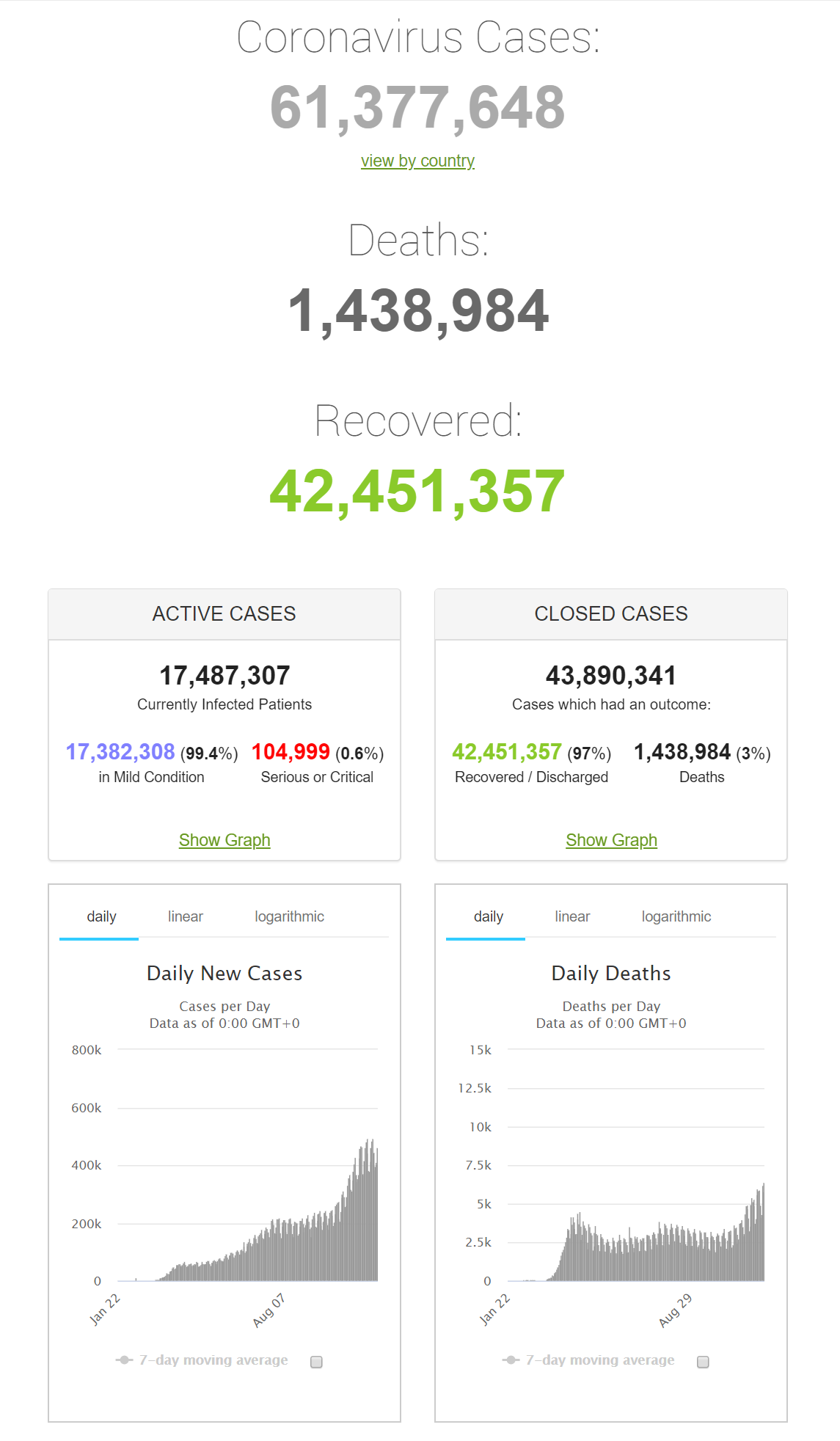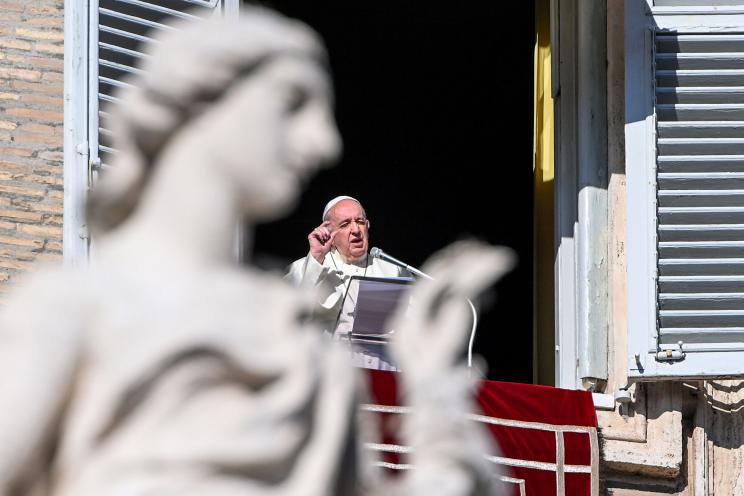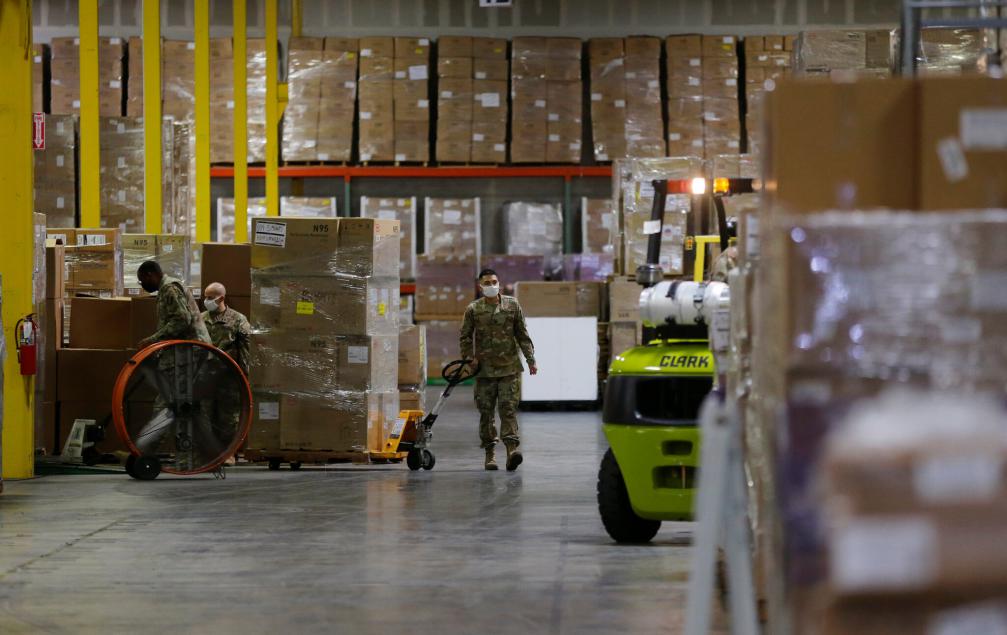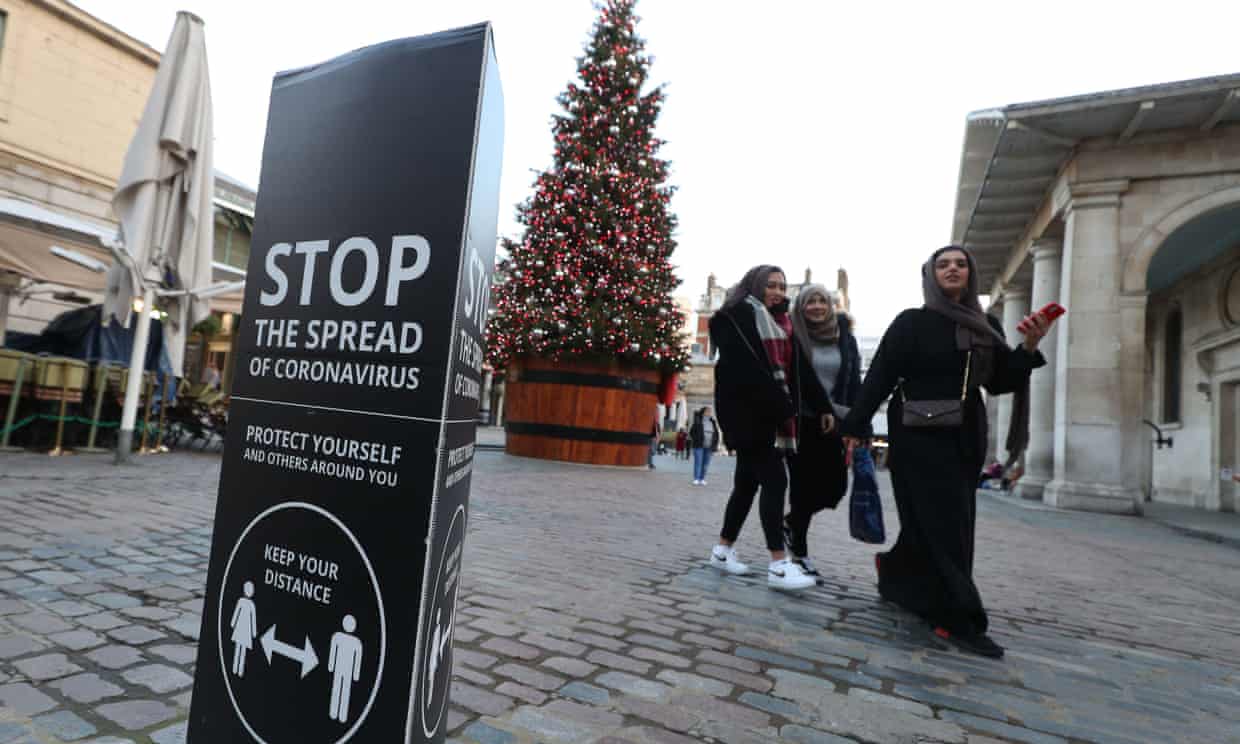
 i_need_contribute
i_need_contribute


|
|
Total |
New |
Total |
|
World |
61,292,165 |
+541,207 |
1,436,981 |
|
13,248,676 |
+108,063 |
269,555 |
|
|
9,309,871 |
+43,174 |
135,752 |
|
|
6,204,570 |
+37,672 |
171,497 |
|
|
2,187,990 |
+25,487 |
38,062 |
|
|
2,183,660 |
+13,563 |
50,957 |
|
|
1,637,844 |
+7,991 |
44,374 |
|
|
1,574,562 |
+17,555 |
57,031 |
|
|
1,509,875 |
+29,003 |
52,850 |
|
|
1,399,431 |
+9,043 |
37,941 |
|
|
1,280,487 |
+9,496 |
36,019 |
|
|
1,070,487 |
+10,335 |
103,597 |
|
|
1,005,307 |
+21,576 |
15,767 |
|
|
956,347 |
+1,888 |
35,785 |
|
|
941,112 |
+16,687 |
15,568 |
|
|
908,346 |
+13,961 |
46,689 |
|
|
778,571 |
+3,069 |
21,289 |
|
|
677,189 |
+15,331 |
11,717 |
|
|
564,967 |
+3,164 |
16,077 |
|
|
545,662 |
+1,570 |
15,235 |
|
|
544,670 |
+2,483 |
12,125 |
|
|
516,753 |
+4,917 |
16,352 |
|
|
511,520 |
+4,051 |
7,779 |
|
|
503,738 |
+7,657 |
13,014 |
|
|
503,123 |
+4,470 |
9,184 |
|
|
456,438 |
+2,292 |
6,524 |
|
|
449,349 |
+9,005 |
10,712 |
|
|
424,297 |
+1,392 |
8,242 |
|
|
386,198 |
+3,306 |
7,843 |
|
|
356,389 |
+322 |
5,840 |
|
|
353,097 |
+5,631 |
11,799 |
|
|
340,684 |
+4,178 |
5,619 |
|
|
333,084 |
+1,169 |
2,834 |
|
|
280,394 |
+6,383 |
4,209 |
|
|
266,038 |
+5,526 |
2,773 |
|
|
227,640 |
+1,614 |
1,412 |
|
|
203,021 |
+5,000 |
2,509 |
|
|
192,047 |
+6,360 |
4,229 |
|
|
188,138 |
+908 |
13,316 |
|
|
163,967 |
+1,305 |
564 |
|
|
160,287 |
+1,755 |
3,018 |
|
|
148,214 |
+7,606 |
1,366 |
|
|
144,276 |
+129 |
8,933 |
|
|
141,547 |
+330 |
872 |
|
|
Dominican |
140,922 |
+1,526 |
2,317 |
|
138,066 |
+215 |
237 |
|
|
137,261 |
+1,861 |
2,022 |
|
|
136,628 |
+3,568 |
3,529 |
|
|
135,742 |
+1,222 |
1,679 |
|
|
130,870 |
+1,785 |
2,068 |
|
|
130,012 |
+1,563 |
1,128 |
|
|
128,400 |
+820 |
1,990 |
|
|
122,200 |
+1,859 |
974 |
|
|
120,685 |
+696 |
4,133 |
|
|
118,690 |
+3,801 |
1,124 |
|
|
115,626 |
+4,009 |
1,552 |
|
|
114,475 |
+368 |
6,596 |
|
|
107,669 |
+560 |
1,672 |
|
|
106,116 |
+544 |
2,888 |
|
|
106,101 |
+3,705 |
1,256 |
|
|
102,894 |
+1,691 |
2,229 |
|
|
101,257 |
+1,953 |
749 |
|
|
101,215 |
+398 |
884 |
|
|
99,306 |
+2,018 |
2,001 |
|
|
92,475 |
+1,168 |
3,034 |
|
|
86,490 |
+21 |
4,634 |
|
|
86,347 |
+162 |
341 |
|
|
85,205 |
+1,639 |
1,846 |
|
|
80,407 |
+610 |
1,140 |
|
|
80,102 |
+780 |
1,427 |
|
|
79,517 |
+639 |
1,704 |
|
|
79,110 |
+1,085 |
2,352 |
|
|
78,493 |
+1,766 |
680 |
|
|
75,395 |
+1,191 |
811 |
|
|
72,342 |
+164 |
607 |
|
|
71,494 |
+307 |
2,036 |
|
|
71,171 |
+427 |
1,251 |
|
|
71,073 |
+1,767 |
1,245 |
|
|
66,974 |
+169 |
1,169 |
|
|
60,752 |
+935 |
348 |
|
|
58,608 |
+1,157 |
1,630 |
|
|
58,195 |
+5 |
28 |
|
|
53,757 |
+2,104 |
449 |
|
|
35,600 |
+656 |
753 |
|
|
34,748 |
+480 |
316 |
|
|
33,316 |
+508 |
469 |
|
|
32,873 |
+773 |
294 |
|
|
32,318 |
+583 |
515 |
|
|
27,867 |
+11 |
907 |
|
|
9,673 |
+220 |
48 |
|
|
5,307 |
+2 |
117 |
|
|
4,791 |
+13 |
45 |
|
|
3,942 |
+16 |
60 |
|
|
1,331 |
+10 |
35 |
Retrieved from: https://www.worldometers.info/coronavirus/
By Kara Fox, CNN
(CNN)When the British-Swedish drugmaker AstraZeneca announced on Monday that its experimental coronavirus vaccine is 70% effective on average, the world exhaled a collective sigh of relief and stocks rallied. Another vaccine with promising results had arrived.
But a lack of clarity surrounding several aspects of the data from the AstraZeneca vaccine trials have raised some eyebrows in the scientific community, potentially setting back the timing for the vaccine to be authorized in Europe and the US.
AstraZeneca said on Monday that study participants in the UK had been given two different courses of the vaccine.
The drugmaker, which developed the vaccine with the University of Oxford, did not however, at the time, explain why they used two different dosing regimens or why the size of one group was significantly smaller than the other.
In one group, 2,741 participants received a half-dose of the vaccine and then a full dose at least a month later. This group was 90% protected against Covid-19.
In the second group, 8,895 participants received a full dose followed by another full dose at least a month later. This group was only 62% protected.
That's why AstraZeneca says their vaccine is 70% effective, on average.
But some scientists are questioning why the company would report on a pooled result of two different trials, as it deviates from standard reporting on clinical trials.
And in the days following that announcement, another point of confusion has emerged.
On Tuesday, Mene Pangalos, AstraZeneca's Executive Vice President who heads up non-oncology research and development, first explained to Reuters that a lab error was the reason why some volunteers had received a smaller dose -- the dose that proved to be 90% effective. "The reason we had the half dose is serendipity," Pangalos said, adding that researchers had "underpredicted the dose of the vaccine by half."
In a statement on Wednesday, Oxford's communications manager for vaccines told CNN that "dose selection for any new vaccine is a complicated area, and in exploring methods of dose selection, we discovered one gave a lower dose than expected."
Oxford elaborated further on Thursday, saying in a statement to CNN that a "difference in the manufacturing process" had led to the error.
That manufacturing problem has since been corrected, the statement said, noting that the UK regulator overseeing the trial had agreed to include "both approaches" in Phase 3.
While AstraZeneca and Oxford face criticism about transparency -- given that they did not mention the error in their press release announcing the results nor on a press call on Monday -- the company believes the world should focus on the trial's positive results.
Speaking to the Wall Street Journal on Wednesday, Menelas Pangalos AstraZeneca's Executive Vice-President said, "The mistake is actually irrelevant.
"Whichever way you cut the data -- even if you only believe the full-dose, full-dose data... We still have efficacy that meets the thresholds for approval with a vaccine that's over 60% effective," Pangalos said, according to the WSJ.
Retrieved from: https://edition.cnn.com/2020/11/26/europe/astrazeneca-oxford-vaccine-data-concerns-intl/index.html
By Zamira Rahim, CNN

(CNN)2020 has been far from festive, but as the year comes to an end, many of Europe's governments are scrambling to avoid stringent lockdowns over the Christmas holidays.
The push to save the celebration comes despite the fact that other religious festivals -- including Christian ones -- have been marked in a muted fashion in recent months.
The UK government on Tuesday unveiled plans to temporarily relax coronavirus restrictions for five days, from December 23 to 27, allowing up to three households to celebrate together in "Christmas bubbles." This means small groups of family and friends will be able meet in person for what may be the first time in months.
England is currently under its second national lockdown and the UK as a whole has recorded more than 1.5 million Covid-19 cases.
"This year, Christmas will be different," said Prime Minister Boris Johnson. "Many of us are longing to spend time with family and friends, irrespective of our faith or background, and yet we cannot throw caution to the wind. The virus doesn't know that it's Christmas."
The previous day, Johnson cautioned that while the festive period may be "the season to be jolly ... it is also the season to be jolly careful, especially with elderly relatives."
Retrieved from: https://edition.cnn.com/2020/11/26/europe/astrazeneca-oxford-vaccine-data-concerns-intl/index.html

Pope Francis on Sunday at the Vatican.Credit...Vincenzo Pinto/Agence France-Presse — Getty Images
Pope Francis, writing for the New York Times Opinion section, says that to come out of this pandemic better than we went in, “we have to let ourselves be touched by others’ pain.”
In this past year of change, my mind and heart have overflowed with people. People I think of and pray for, and sometimes cry with, people with names and faces, people who died without saying goodbye to those they loved, families in difficulty, even going hungry, because there’s no work.
Sometimes, when you think globally, you can be paralyzed: There are so many places of apparently ceaseless conflict; there’s so much suffering and need. I find it helps to focus on concrete situations: You see faces looking for life and love in the reality of each person, of each people. You see hope written in the story of every nation, glorious because it’s a story of daily struggle, of lives broken in self-sacrifice. So rather than overwhelm you, it invites you to ponder and to respond with hope.
To come out of this crisis better, we have to recover the knowledge that as a people we have a shared destination. The pandemic has reminded us that no one is saved alone. What ties us to one another is what we commonly call solidarity. Solidarity is more than acts of generosity, important as they are; it is the call to embrace the reality that we are bound by bonds of reciprocity. On this solid foundation we can build a better, different, human future.
Retrieved from: https://www.nytimes.com/live/2020/11/26/world/covid-19-coronavirus/the-pandemic-is-a-crisis-that-reveals-what-is-in-our-hearts-the-pope-says

Members of the National Guard at the Texas Division of Emergency Management’s warehouse in San Antonio. The military has worked behind the scenes to bring a virus vaccine to the public.Credit...Eric Gay/Associated Press
When President Trump talks about efforts to deliver the coronavirus vaccine to millions of Americans eager to return to their normal lives, he often says he is “counting on the military” to get it done.
Mr. Trump has given the impression that troops would be packing up vials, transporting them from factories to pharmacies and perhaps even administering shots. And, at times, military officers working on the sprawling interagency program to move those vaccine doses from drug companies into doctors’ offices have indicated the same thing.
In reality, the role of the military has been less public and more pervasive than this characterization suggests.
When companies have lacked the physical spaces needed to conduct their drug trials, the Defense Department has acquired trailers and permits to create pop-up medical sites in parking lots. When a required piece of plastic or glass was in short supply, the military leveraged a law passed during the Korean War to force manufacturers to move them to the front of the line. Should a hurricane hit somewhere, blocking trucks, the military has transportation ready.
But the distribution of vaccines will be left largely to their producers and commercial transportation companies. Black Hawk helicopters will not be landing next to neighborhood drugstore to drop off doses.
Scores of Defense Department employees are laced through the government offices involved in the effort, making up a large portion of the federal personnel devoted to the effort. Those numbers have led some current and former officials at the Centers for Disease Control and Prevention to privately grumble that the military’s role in Operation Warp Speed was too large for a task that is, at its core, a public health campaign.
“Frankly, it has been breathtaking to watch,” said Paul Ostrowski, a retired Army lieutenant general and the director of supply, production and distribution for Operation Warp Speed.

London’s Covent Garden on Thursday. The capital is expected to enter tier 2 from next Thursday with 99% of England in the two strictest tiers. Photograph: Yui Mok/PA
Coronavirus infections are largely levelling off in England although prevalence remains high, data suggests, as 99% of the country prepares to enter the two strictest tiers of control measures from next week.
Government data shows 18,213 people in England were reported to have tested positive for coronavirus on Wednesday, down from a high of 33,470 on 12 November. Reported deaths reached a second-wave peak of 604 on Wednesday – although trends in the number of deaths typically lag behind changes in case numbers.
Cases were falling in every English region between 19-21 November compared with a week earlier, according to data by specimen date, while test-and-trace figures show 8.8% of those tested having a positive result between 12-18 November, down from 9.6% the previous week.
Experts cautioned that such data might not give the full picture, however – not least as only symptomatic people are advised to get a test, while daily figures are also affected by the number of tests carried out in different areas.
Office for National Statistics (ONS) data from a survey of randomly selected households shows the positivity rate appeared to be levelling off in England in the week to 21 November, with about one in 85 people in the community thought to have Covid – a similar figure to the week before.
Cases are rising once again among secondary-school-aged children, although they have levelled off or fallen in other age groups, and there are regional variations, experts said.
“Over the last week, positivity rates have continued to increase in London, the east of England and the south-east. However, rates now appear to be decreasing in the north-west and the east Midlands,” the team reported.
Similarly, data released by the MRC Biostatistics Unit estimates that on 22 November, R (the reproduction number) was about 1 in most regions, and less than 1 in north-east England and Yorkshire and the north-west, although it could be above 1 in the south-east.
The number of deaths occurring each day has already reached a peak in most regions, data suggests – although delays in reporting mean figures may appear to increase for some weeks.
While Prof Daniela De Angelis, the programme leader and deputy director of the unit, said R was lower in all regions than the week before, she cautioned against relaxing restrictions too far.
“We remain concerned that R may not have fallen to a level sufficiently below 1, which strongly suggests that effective measures to control infection rates must continue to be in place after the end of the current lockdown period,” she said.
Prof Tim Spector of King’s College London, the lead scientist on the Zoe Covid Symptom Study app, said the latest data based on swab results from users of the app over the two weeks up to 22 November reveals that the nationwide R value is now about 0.9.
He voiced dismay at the new restrictions. “I’m disappointed to see so many regions going into tier 3 when the latest data suggests that symptomatic cases are continuing to fall,” he said. “We need to consider more carefully the wider physical, social and mental health implications of excessive mandatory restrictions if they are not justified by the recent data.”
Retrieved from: https://www.theguardian.com/world/2020/nov/26/covid-cases-levelling-off-as-england-prepares-to-re-enter-tier-system
Mass vaccination against Covid-19 is unlikely to start in Africa until midway through next year and keeping vaccines cold could be a big challenge, the continent’s disease control group said on Thursday.
Some European countries expect to start rolling out vaccination campaigns as early as January.
But health campaigners are worried that Africa will find itself near the back of the queue for Covid-19 vaccines after wealthier nations signed a raft of bilateral vaccine supply deals with pharmaceutical companies.
“We are very concerned as a continent that we will not have access to vaccines in a timely fashion,” said John Nkengasong, director of the Africa Centres for Disease Control and Prevention, an African Union agency.
· France reported 13,563 new coronavirus infections on Thursday, compared with 16,282 on Wednesday and 21,150 a week ago, suggesting the spread of the virus continued to slow in the fourth week of a national lockdown.
· British stocks fell on Thursday amid heightened concerns over economic growth after the health minister, Matt Hancock, said more than a third of the population would remain under tough Covid-19 restrictions at the end of a national lockdown.
· Greece has broken the toll of 2,000 deaths as a result of Covid-19. The public health organisation, EODY, reported the country had crossed the grim threshold following a further 99 fatalities over the last 24 hours.
· Italy reported 822 Covid 19-related deaths on Thursday, up from 722 the day before, and 29,003 new infections, up from 25,853 on Wednesday, the health ministry said. There were 232,711 swabs carried out in the past day, compared with a previous 230,007.
· Croatia will close cafes and restaurants and ban weddings until Christmas as the number of coronavirus cases hit a record high for the second day in a row, the government said. The country of 4 million reported 4,009 new cases and 51 deaths on Thursday, with 21,725 active cases.
· The second wave of Covid-19 infections that has hit Sweden could peak in mid-December, health officials said on Thursday, saying developments will depend on how well the public follows social distancing advice.
· Mass vaccination against Covid-19 is unlikely to start in Africa until midway through next year and keeping vaccines cold could be a big challenge, the continent’s disease control group said on Thursday.